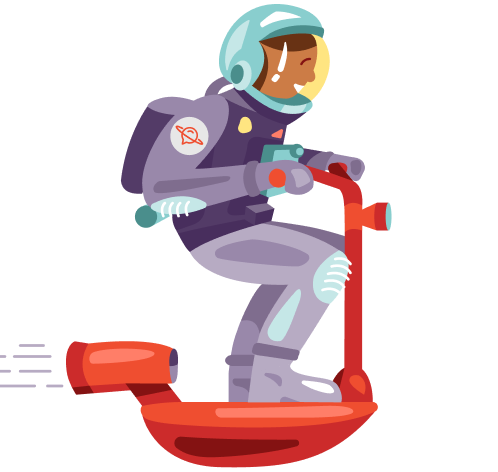Quick start guide
Why have you created Planet Puberty?
It can be overwhelming trying to figure out where to begin, so we suggest taking some time to reflect on what is most important for you and your child in learning about puberty. Think about:
Your own experience of puberty
What age did you go through puberty?
How was that experience for you?
What do you want to change for your child?
Your own experience of sexuality education
Was it positive or negative?
How would you want your child’s experience to be different or similar?
Your family or religious values
What messages are important for you to pass on to your child?
Your own feelings about puberty and sexuality
What makes you uncomfortable?
How can you get more comfortable with certain topics?
How you can integrate puberty into your childs current learning style
What type of resources do they engage with?
What type of support do they require to learn about other things?
What your child already knows about puberty and what they still need to learn.
Some other things you can do when you first start teaching your child about puberty are:
- collecting information that might be useful for your child. This can include things like factsheets, books and videos
- reviewing all the resources and media you intend to show your child to ensure you are familiar and comfortable with the content and approach
- brushing up on your own puberty knowledge by having a read through this resource and familiarising yourself with some beginner strategies
- continue persistently (e.g. masturbation in public places)
- are compulsive (e.g. obsessive seeking of pornography)
- put your child or others at risk (e.g. self-harm or forced touching of others’ private body parts)
- involve force, bribery, threats, coercion or manipulation (e.g. using bribery to touch another child’s private body parts)
- lack of understanding of social rules
- boredom
- stress or anxiety
- underlying medical issue
- witnessing the behaviour in other people and copying it (e.g in pornography)
- past or current experiences of abuse
- http://www.wbsass.com.au/themes/default/basemedia/content/files/Traffic-LightsBrochure.pdf
- Traffic lights app Download: Download at App Store – Download at Google Play
General teaching strategies
You are the expert
You know your child best. You know how they learn, how they communicate and how they express themselves. Use this knowledge! Adapt teaching strategies about puberty the same way you would help your child to build capacity in other areas like learning to communicate with others, toilet training or even doing their schoolwork.
Be proactive and communicate early
Your child may never ask you about puberty, but they still need to know about it. It’s common for children to still feel shy or embarrassed about puberty, so parents need to take the lead in introducing puberty education. Be proactive and start talking about bodies and development as early as you can using your child’s preferred communication style. Children with intellectual disability and autism spectrum disorder often need extra time to prepare for any big changes they experience, so the earlier and more often you can talk about things like private parts, hygiene and body development, the easier changes will be to manage. If you haven’t started talking to your child about puberty yet, that’s OK. It’s never too late!
Use the correct names
Using the correct names for private body parts is essential to good puberty and sexuality education and support. Penis, vagina, anus and breasts should all be named as if you were talking about your nose or your toes. Check out the page for more information.
Think outside of ‘sex’
Puberty is a time where your child develops into a teenager and a young adult. Calling it ‘sex education’ doesn’t do this stage of life justice. Topics can include bodies, babies, love, sexuality, respectful relationships, hygiene, decision making, personal and family values and figuring out who you are as an individual. It is about equipping your child with the skills they need to be healthy and happy adults who are as independent as possible.
You don’t need to have all the answers
It’s OK to not know all the answers! Keeping communication open by saying something like “That’s a good question. I don’t know how to answer it. We can find out together.” This gives your child confidence in asking you questions and gives you the opportunity to model positive health-seeking behaviour.
Use teachable moments
Teachable moments are a great way to help make conversations more natural and less stressful for you and more meaningful for your child. You can use day-to-day situations, movies, news events, or songs to introduce topics. This can be particularly useful if your child has a special interest area or a favourite tv show. For example, the news of a family member’s pregnancy can start a conversation about how babies are made.
Make a library at home
Having easy to read resources at home can be a great way to build your child’s confidence in identifying health information and getting them comfortable with puberty education. It’s also useful to help build your confidence. There are a lot of resources available about puberty which you can use to help teach your child – you don’t need to make everything yourself! You will find suggested resources, links, videos, worksheets and book recommendations throughout this website.
Here are some great books to get you started
Think about your own values and beliefs
Puberty and sexuality education can look different for different families. It can also look different depending on your culture and spiritual beliefs. This is OK. We recommend reflecting on what is important in your own family unit and community to inform how you provide support. For example, some families don’t feel comfortable with tampons. This is OK. It’s still good to teach about tampons so that if your child hears about them from a friend, you can talk to them about it.
Be inclusive
Lesbian, gay, bisexual, transgender, intersex and queer (LGBTIQ) people are a part of every community and beloved members of many families. This is normal and is important to include in any puberty and sexuality education.
It is important for your child to understand what these terms mean so that they can:
- better understand how to treat LGBTIQ people with respect
- better understand themselves, if they are unsure of their sexual or gender identity
Check out (Supporting Gender and Sexual Identity) for more information.
Remember, you’re not alone
It’s important to remember that you are not alone in providing support to your child around puberty and sexual development. All across Australia, there are families just like your own. That’s why we created this resource. Help is also available if you need it. You will find links to referral and support services in your state here:
Conversation Starters
You’re getting a bit older now and growing up! Do you know how people become a grown up?
Your body might start changing soon, have you noticed anything different?
I can see that you’re touching your private parts a lot today. Are you uncomfortable? Can you tell me if you are in pain/discomfort and we can see how to make it better?
Touching your private body parts can feel good, but you must do your homework as well. Let’s figure out when you can have private time in the afternoon to make sure that we get everything done AND you get some time to relax!
Try our lessons
The topics
Explore and understand these topics below to help support your child through puberty.





